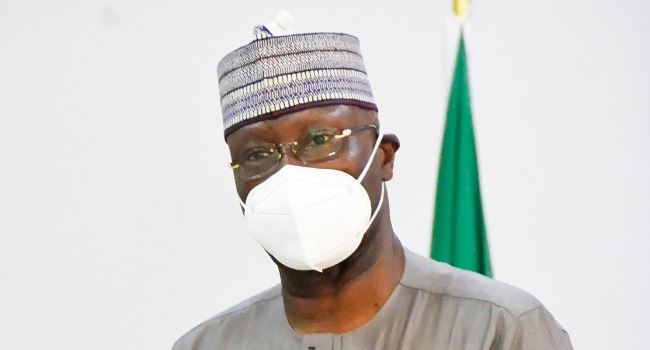News
Nigerian govt to build COVID-19 isolation centres in 36 states, lists steps to beat spread in Kano

The Federal Government on Tuesday said it will build at least one state of the art intensive care units, isolation/treatment centres in the 36 states of the country and the Federal Capital Territory (FCT) to curb the spread of infectious diseases in the country.
The Chairman of the Presidential Task Force on COVID-19 and Secretary to the Government of the Federation (SGF), Boss Mustapha stated this while addressing members of the House of Representatives during plenary on Tuesday.
Mustapha also disclosed that government has mobilised about 3300 informants through the WHO/polio programme for house-to-house search and reporting of suspected COVID-19 cases as part of measures to tackle the rising case in Kano state.
The SGF also informed the lawmakers that the Federal Government will soon announce significant additional material and technical resources to complement state government’s efforts in combating the pandemic in Kano.
Urging the legislators to support the activities of the task force, Mustapha said the PTF was working towards strengthening the country’s public health emergency preparedness through system building and infrastructure development,
According to Mustapha, out of the about 12,504 persons earmarked for contact tracing, about 11,840, representing 95 per cent, have been traced, adding that about 9,828 health workers have been trained to beef up case management.
The SGF further informed the lawmakers that government has also secured insurance cover for 5,000 frontline health workers while government and health professionals have signed an MoU on the hazard allowance and other incentives.
The SGF who lamented that Kano was fast emerging as the epicentre of the COVID-19 pandemic in the North, said the PTF has been working closely with the Kano State Government and key stakeholders to identify the issues and seek immediate solutions, adding that a technical team of 41 staff from NCDC, supported by 17 staff from WHO have been deployed to provide technical assistance to Kano State Emergency Operations Centre (SEOC).
He added: “A team of clinicians and public health experts under the auspices of the Federal Ministry of Health is also in Kano to provide training on case management and strengthen the capacity of the State to handle emergencies”.
Mustapha, who identified the key weakness of the Kano COVID-19 response is lack of adequate manpower for surveillance and contact tracing, stressed that the PTF has mobilised resources from across the health sector, including multilaterals, bilaterals, MDAs and the private sector, to facilitate accelerated expansion of the rapid response teams (RRTs) from 21 to 50.
He said as part of the its mandate, the PTF was working towards strengthening the country’s public health emergency preparedness through system building and infrastructure development.
Mustapha said: “COVID-19 pandemic has exposed the fragile status of our health system and the near absence of the structures or building blocks necessary for the public health protection of our communities.
Read also: Lagos govt says it reached 440,000 households with food palliatives
“In this regard, we plan to establish state-of-the-art intensive care units and isolation/treatment centres in each of the 36 States plus FCT. We will also upgrade molecular laboratory facilities across the country and ensure that a COVID-19 testing centre is available in every State through the utilization of existing GeneXpert machines.
“This scale-up of infrastructure will also require additional staff training and a review of existing manpower needs for the country. There’s no doubt that a strengthened and well-resourced health system will not only place the country in a better position to deal with future emerging infections such as Lassa fever but will also provide a solid foundation for medical research and development.
‘“The post-COVID-19 era is going to be a challenging one. As a country, we need to prepare for what will be major changes to our long-term social interactions, events, personal contacts and economic prospects.
“Just as important is the need to provide a strengthened legislative framework for dealing with future public health emergencies in a changing world. The current Quarantine Act needs to be updated due to the unique nature of emerging infections such as COVID-19, the dramatic impact this has on sectors beyond just health and the urgency required to deal with such pandemic.”
Join the conversation
Support Ripples Nigeria, hold up solutions journalism
Balanced, fearless journalism driven by data comes at huge financial costs.
As a media platform, we hold leadership accountable and will not trade the right to press freedom and free speech for a piece of cake.
If you like what we do, and are ready to uphold solutions journalism, kindly donate to the Ripples Nigeria cause.
Your support would help to ensure that citizens and institutions continue to have free access to credible and reliable information for societal development.
























